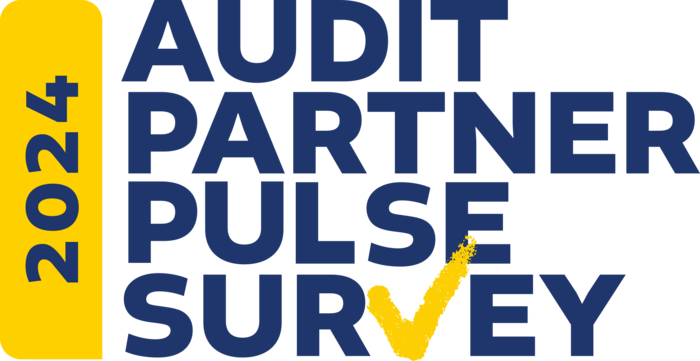
The Center for Audit Quality’s (CAQ) Audit Partner Pulse Survey, now in its third year, asked audit partners at the country’s leading public company audit firms about their views on the current business environment in the United States. Topics covered include U.S. economic health, challenges and risks facing businesses, and how they see business leaders adjusting their strategies in the current environment.
Over the course of their careers, audit partners spend decades honing industry-specific expertise on how companies across the economy operate. This provides auditors with a thorough understanding of the industries in which the companies they audit function, from financial services to oil and gas to healthcare. By the nature of their work, public company audit partners have unique insights into how America’s businesses operate. In the fall survey, conducted in September and October 2024, continued concerns over macroeconomic matters like inflation, as well as domestic and global political upheaval, were fresh on the minds of audit partners.
Economic Outlook
Businesses Weigh Recession, Geopolitical Risks
For the first time since the inception of the Audit Partner survey, geopolitical risks have emerged as one of the top economic concerns among audit partners for the coming year. A combination of factors—including ongoing conflicts in Ukraine and the Middle East, and rising tensions in Taiwan—are contributing to increased market volatility.
Chart
Despite the U.S. economy’s ongoing resilience, audit partners' outlook for the economy over the next year is only neutral, with most believing a recession is likely on the horizon. Audit partners are likely watching potential recession indicators, such as recent federal rate cuts, a possible government shutdown, and a fluctuating labor market.
Chart
Additionally, audit partners continue to express concerns —and accurately predicted in 2023— that inflation will impact businesses for the foreseeable future. This is despite the Federal Reserve’s recent signaling and action to bring down interest rates. Coupled with the concern over recession indicators, ongoing inflation likely contributes to the more cautious stance on the economy.
Chart
Businesses Concerned, but Not Preparing for, U.S. Election
According to the audit partners, most businesses within their industry sectors are attuned to the potential impact of the upcoming U.S. election on their financial performance over the next twelve months. However, these companies are not yet adjusting their strategies and do not currently foresee direct disruptions from the election. This suggests that public companies feel prepared to navigate foreseeable market challenges that may arise from a changing presidential administration and potential changes in control of Congress.
Chart
Shifting Labor Strategies Look to Upskilling Current Workforce, Reduce Headcount
Public companies are shifting their strategic priorities for the coming year in light of the current uncertain economic environment. While talent and labor were top concerns during the "Great Resignation" in Spring 2022, companies are now placing less emphasis on these issues, with labor shortages dropping significantly from the audit partners’ list of key economic risks. Instead, there is a growing focus on cost management, financial performance, and growth.
With respect to the workforce, the survey results indicate both positive and negative outcomes for workers. While audit partners noted that upskilling employees has become the top human capital trend at companies in their primary industry sector and a significant portion of audit partners also selected increasing compensation, reducing headcount, and decreasing workplace flexibility were the second and third most chosen strategies, respectively.
Chart
The Impact of Artificial Intelligence on Labor Strategies
The pull back on labor strategies may be partly driven by increased investments in artificial intelligence (AI) technologies. Audit partners report that companies within their primary industry sectors are utilizing AI across various business functions. For instance, customers who have recently interacted with an automated call or AI shopping assistant will not be surprised to learn that customer service and marketing are among the primary areas where auditors see companies deploying AI.
Chart
Organizations Move Away from Cryptocurrency
Despite media excitement surrounding cryptocurrency, most public companies remain largely uninvolved, according to audit partners. Earlier iterations of the Audit Partner survey indicated that some sectors, particularly technology and finance, were exploring this digital currency, but recent findings suggest a shift in sentiment. Notably, several major scandals—most prominently the collapse of the FTX cryptocurrency exchange and hedge fund—may have contributed to this decline in interest.
Chart
Download the full report PDF for a detailed appendix of all survey questions and responses.

